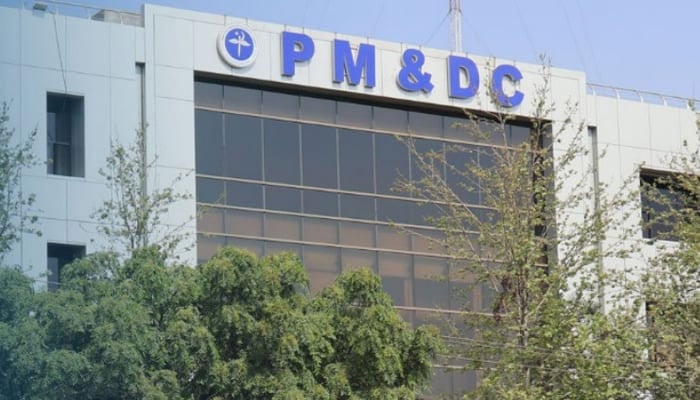PMDC fails to fix fee for private medical colleges
Committee recommended annual fee of Rs1.2 million, but proposal was not approved
ISLAMABAD: The Pakistan Medical and Dental Council (PMDC), in a meeting on Thursday, failed to set a maximum tuition fee for the academic session 2024-25 and instead decided to review the fee structure presented by private institutions.
“The PMDC Council remained inconclusive regarding fixing the fee for private medical and dental colleges for the academic session 2024-25, as proposed by a high-powered specialized committee. The committee had recommended an annual fee of Rs1.2 million, but the proposal was not approved,” a member of the PMDC Council told The News.
Anticipating a possible fee cap, the Pakistan Association of Private Medical and Dental Institutions (PAMI) had written to the medical education regulator, warning that they would not accept any tuition fee ceiling set by PMDC, arguing that the PMDC Act does not allow the council to fix fees.
During the PMDC Council meeting, legal experts also advised that PMDC does not have the authority to determine the tuition fees for private medical and dental colleges. Instead, colleges are only required to inform PMDC about the fees they plan to charge before the commencement of the academic session, as per the PMDC Act.
“So the PMDC Council has asked the committee to review the fee structure of private medical and dental colleges within a week and determine whether it is justified or not,” the PMDC Council member added. When approached, PMDC’s acting Registrar Dr. Shaista Faisal claimed that she did not attend the meeting.
Earlier, a committee comprising officials from the federal health ministry and PMDC had recommended capping the annual tuition fee at Rs1,212,468 for the academic session 2024-25. The recommendation was made to regulate soaring tuition costs, as private institutions are currently charging between Rs2.5 million to Rs3 million per year.
According to confidential documents available to The News, the proposed fee structure was finalized after detailed deliberations, as both the federal health ministry and PMDC were under intense pressure from parliamentarians and parents to regulate the skyrocketing tuition fees in private medical colleges.
Documents also reveal that a high-powered specialized committee and a sub-committee formed to review tuition structures found that many private institutions were charging excessive fees without justification. The sub-committee reviewed past regulations, noting that in 2010, private medical colleges charged Rs500,000 per year, which was later increased to Rs600,000 in 2012.
In 2018, the Supreme Court capped the annual fee at Rs850,000, allowing a 5% annual increase under the 2020-21 regulations, which raised it to Rs997,500. However, in recent years, private colleges have drastically increased tuition fees, now ranging from Rs2.5 million to Rs3 million annually, far exceeding regulated limits.
The sub-committee’s report recommended that the proposed fee of Rs1,212,468 remain fixed for the entire duration of a student’s enrollment, preventing institutions from unexpected mid-program fee hikes. The committee also called for strict enforcement of regulations, annual audits, and financial transparency from private colleges to ensure compliance with Section 20(7) and 20(8) of the PMDC Act 2022.
The committee emphasized the urgent need for regulatory oversight, including penalties for non-compliance and annual audits to ensure adherence to the approved fee structure. Additionally, it stressed the importance of a grievance redressal mechanism to address complaints from students and parents regarding excessive fees or unjustified charges.
-
 Columbia University Sacks Staff Over Epstein Partner's ‘backdoor’ Admission
Columbia University Sacks Staff Over Epstein Partner's ‘backdoor’ Admission -
 Ozzy Osbourne's Family Struggles Behind Closed Doors
Ozzy Osbourne's Family Struggles Behind Closed Doors -
 Dua Lipa Claims Long-distance Relationship 'never Stops Being Hard'
Dua Lipa Claims Long-distance Relationship 'never Stops Being Hard' -
 BTS Moments Of Taylor Swift's 'Opalite' Music Video Unvieled: See Photos
BTS Moments Of Taylor Swift's 'Opalite' Music Video Unvieled: See Photos -
 Robin Windsor's Death: Kate Beckinsale Says It Was Preventable Tragedy
Robin Windsor's Death: Kate Beckinsale Says It Was Preventable Tragedy -
 Rachel Zoe Shares Update On Her Divorce From Rodger Berman
Rachel Zoe Shares Update On Her Divorce From Rodger Berman -
 Kim Kardashian Officially Takes Major Step In Romance With New Boyfriend Lewis Hamilton
Kim Kardashian Officially Takes Major Step In Romance With New Boyfriend Lewis Hamilton -
 YouTube Tests Limiting ‘All’ Notifications For Inactive Channel Subscribers
YouTube Tests Limiting ‘All’ Notifications For Inactive Channel Subscribers -
 'Isolated And Humiliated' Andrew Sparks New Fears At Palace
'Isolated And Humiliated' Andrew Sparks New Fears At Palace -
 Google Tests Refreshed Live Updates UI Ahead Of Android 17
Google Tests Refreshed Live Updates UI Ahead Of Android 17 -
 Ohio Daycare Worker 'stole $150k In Payroll Scam', Nearly Bankrupting Nursery
Ohio Daycare Worker 'stole $150k In Payroll Scam', Nearly Bankrupting Nursery -
 Michelle Yeoh Gets Honest About 'struggle' Of Asian Representation In Hollywood
Michelle Yeoh Gets Honest About 'struggle' Of Asian Representation In Hollywood -
 Slovak Fugitive Caught At Milano-Cortina Olympics To Watch Hockey
Slovak Fugitive Caught At Milano-Cortina Olympics To Watch Hockey -
 King Charles Receives Exciting News About Reunion With Archie, Lilibet
King Charles Receives Exciting News About Reunion With Archie, Lilibet -
 Nvidia Expands AI Infrastructure With Nevada Data Centre Lease
Nvidia Expands AI Infrastructure With Nevada Data Centre Lease -
 Royal Family Shares Princess Anne's Photos From Winter Olympics 2026
Royal Family Shares Princess Anne's Photos From Winter Olympics 2026




